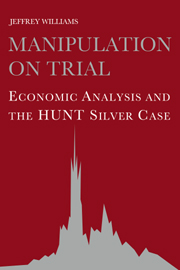Book contents
- Frontmatter
- Contents
- List of figures
- List of tables
- Preface
- Foreword by Thomas O. Gorman
- 1 Why the Hunt silver case?
- 2 Turmoil in the silver market
- 3 Identifying a manipulation
- 4 Testing for the cause of the price rise in silver
- 5 Determining the appropriate price of silver
- 6 Inferring manipulative intent
- 7 The predicament of economic analysis in the courtroom
- Glossary of commodity market terms
- References
- Index
7 - The predicament of economic analysis in the courtroom
Published online by Cambridge University Press: 17 September 2009
- Frontmatter
- Contents
- List of figures
- List of tables
- Preface
- Foreword by Thomas O. Gorman
- 1 Why the Hunt silver case?
- 2 Turmoil in the silver market
- 3 Identifying a manipulation
- 4 Testing for the cause of the price rise in silver
- 5 Determining the appropriate price of silver
- 6 Inferring manipulative intent
- 7 The predicament of economic analysis in the courtroom
- Glossary of commodity market terms
- References
- Index
Summary
As the jury deliberated, Judge Lasker encouraged one last attempt at settlement. Minpeco offered to accept $30 million, close to its offer at the start of the trial six months before and far below the $450 million it might be awarded. Nonetheless, the Hunts, true to their inclinations, hazarded the jury's verdict.
The jury found the defendants liable on virtually every charge against them. It found Bunker Hunt, Herbert Hunt, Lamar Hunt, IMIC, and Mahmoud Fustok liable for manipulation, monopolization, fraud on the market, and conspiracy; it found all but Lamar Hunt liable for racketeering. It awarded Minpeco $65.7 million in damages, an amount trebled under the antitrust and racketeering statutes. Given the $64.7 million received by Minpeco in previous settlements, the defendants therefore became liable for just over $132 million.
Just after the jury's verdict was officially recorded in late August 1988, the Internal Revenue Service obtained a lien on Bunker Hunt's and Herbert Hunt's assets to the full $600 million of taxes that it claimed were due from the early 1980s, principally on silver transactions. Unable to conduct their financial affairs with their assets frozen, on September 21, 1988, Bunker Hunt, Herbert Hunt, their wives, and trusts in their names filed for bankruptcy. The two brothers were forced to divest themselves of most of their personal assets, for instance, Bunker Hunt his prized antique coin collection and racing stables. The Hunt family's major oil holdings, Placid Oil and Penrod Drilling, also filed for bankruptcy.
- Type
- Chapter
- Information
- Manipulation on TrialEconomic Analysis and the Hunt Silver Case, pp. 190 - 215Publisher: Cambridge University PressPrint publication year: 1995



